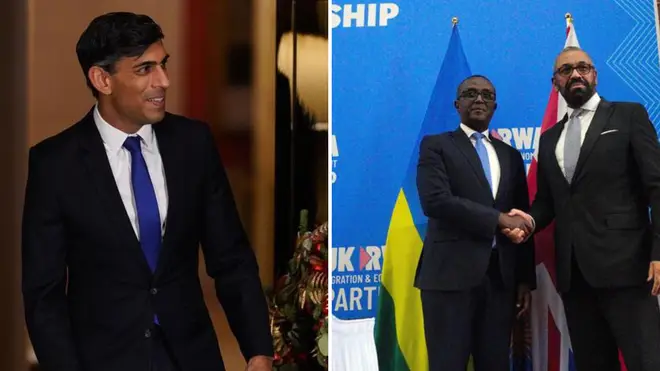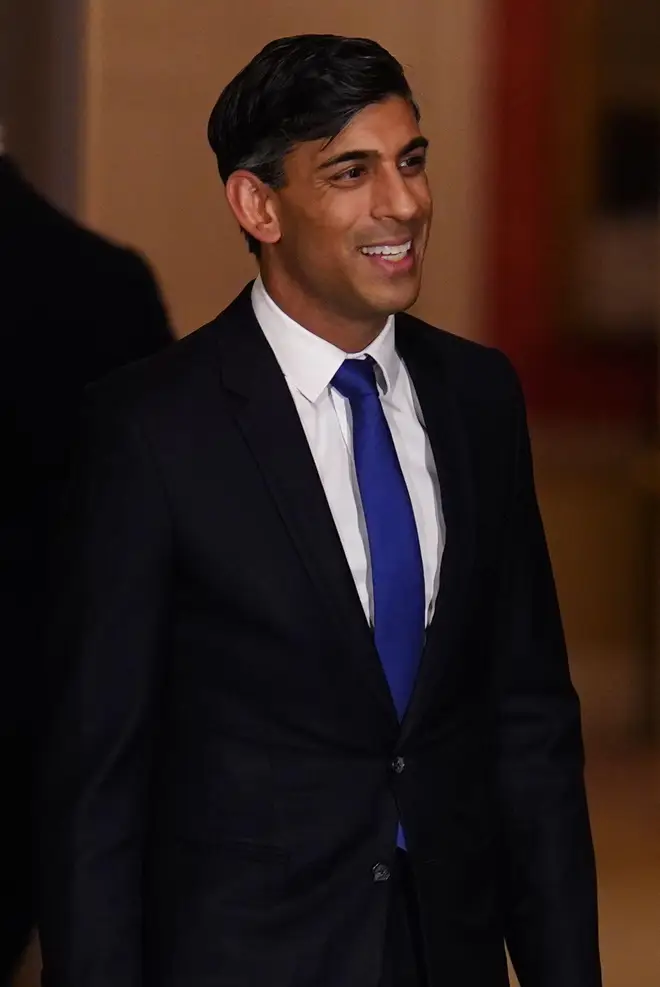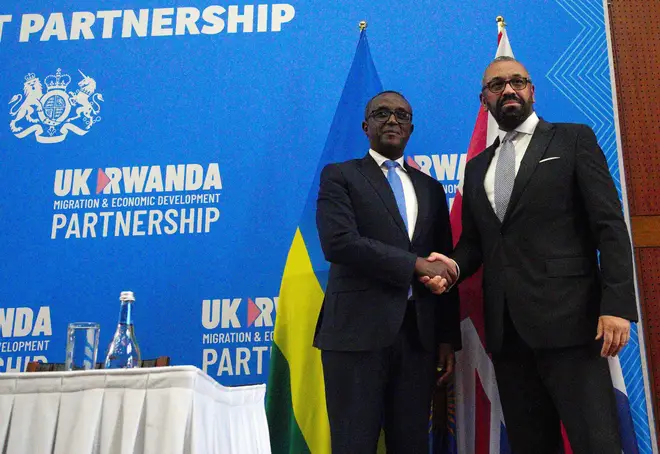
Paul Brand 10am - 12pm
8 December 2023, 23:19

The government's revised plan to send illegal migrants to Rwanda has a 50% chance of succeeding at best, according to legal advice given to ministers.
Government lawyers have said that there is a roughly 50% likelihood that the scheme will enable flights to take off for the east African country before a general election next year.
The new proposals, which come after the plan was rejected by the Supreme Court last month, are expected to be voted on next month.
But even if they get through Parliament, government lawyers believe there is a good chance that the European Court in Strasbourg will block them, the Times reported. The court previously blocked flights in June last year.

The new Rwanda plans give ministers the ability to disregard an injunction from Strasbourg, but it is unclear if this would breach the UK's responsibilities as a signatory of the European Convention on Human Rights.
Mr Sunak has previously said that he would "not allow a foreign court to block these flights".
A government source said: "We do not comment on or share government legal advice and it would be very wrong for anyone recently departing government to do so.
"Ministers are reassured that this bill goes as far as it can within international law and therefore ensures we can get flights off to Rwanda next year."
Meanwhile the Home Office is set to publish 'evidence' that Rwanda is a safe country to send refugees, after the Supreme Court ruled that sending migrants there could pose danger.
The material will show that the UN sent 163 refugees to Rwanda the day after the Supreme Court's decision.

Mr Sunak is under pressure after immigration minister Robert Jenrick resigned over the plan.
Other critics include Suella Braverman, the recently sacked Home Secretary, who contends that the legislation will not succeed in preventing asylum seekers from making individual claims to the courts, resulting in a “merry-go-round of legal claims and litigation”.
Mr Sunak also faces increasing pressure from backbench MPs on the right of the Conservative party, some of whom believe that the legislation doesn’t go far enough to address the problem of small boat crossings.
Mr Jenrick said that a rule that allows individual migrants to challenge being sent to Rwanda was likely to prove a stumbling block.
He said: "Backlogs will likely build, and cases that would at best take months to resolve will be stayed considerably longer. Injunctions will likely follow.
"And we will begin losing bail claims, forcing us to release people from detention. People will of course abscond and disappear into communities.
"The idea, therefore, that this Bill will guarantee all those arriving are detained and swiftly removed is for the birds. The only Bill capable of delivering that is a Bill that guarantees removal within days, not months, of arrival by blocking off individual challenges that would otherwise prevent that."

James asks how Rishi Sunak is in 'such an almighty mess' over Rwanda plan
Meanwhile the total cost of the policy has more than doubled to £290m.
It emerged on Thursday that the cost of the scheme had risen substantially, with an extra £100m being paid to Kigali earlier this year, and a further £50m being committed for 2024.
LBC analysis revealed that almost 400,000 asylum claims could have been handled by the Home Office with the money the government has already committed to the Rwanda policy.
The analysis, which the former shadow Home Secretary has described as proof the Rwandan government “must be laughing all the way to the bank”, is based on a situation where the money had taken an alternative path, with the cash being spent on employing additional asylum caseworkers rather than handing £290m to Kigali.

Lewis Goodall calls out Rishi Sunak's party strategy
This would have resulted in over 3,000 additional asylum caseworkers on a three-year contract - the same time period covered by the UK’s current financial commitments to Rwanda.
Each of these workers, based on the Home Office’s own figures, could have cleared an average of 44 asylum cases per year; in total, this equates to just under 400,000 asylum claims over a three-year period.
This is more than double the current asylum backlog, which stands at north of 175,000 cases.
Responding to LBC’s findings, Dame Diana Johnson, who chairs the committee which scrutinises the Home Office’s decision making, said: “It’s becom[ing] less and less clear what the Rwanda policy will ever actually achieve.
“The Government has already spent £240 million with another £50 million to be paid on this scheme and there seems no immediate likelihood that enough numbers will be going there to make it cost effective compared to processing claims in the UK. The deterrent effect also remains unproven.”
Former Shadow Home Secretary, Diane Abbott, also weighed in, stating the Rwandan government “must be laughing all the way to the bank” and branding the scheme as “not just cruel [and] unworkable but also increasingly ridiculous.”
A Home Office spokesman said: “The Home Secretary has been clear that the partnership with Rwanda plays a key part in our efforts to stop the boats and save lives.
“We have more than doubled the number of asylum decision makers and have significantly increased productivity which has reduced the backlog of legacy asylum cases by over 80%.
"We remain on track to meet the Prime Minister’s commitment to clear the legacy backlog by the end of the year.”